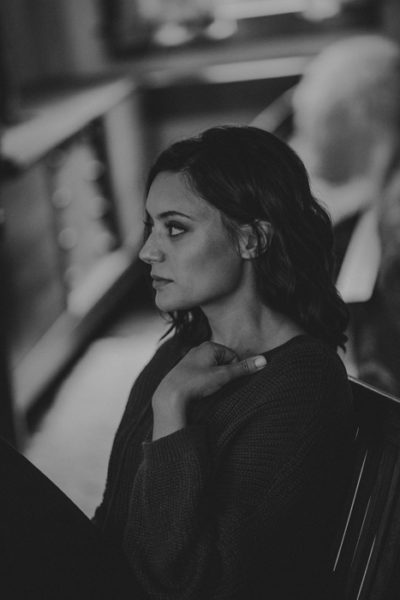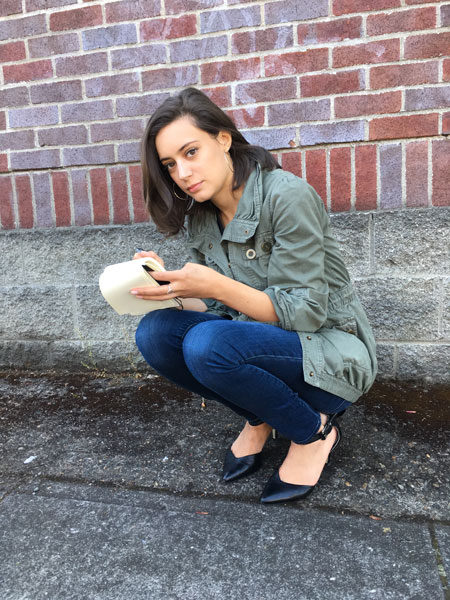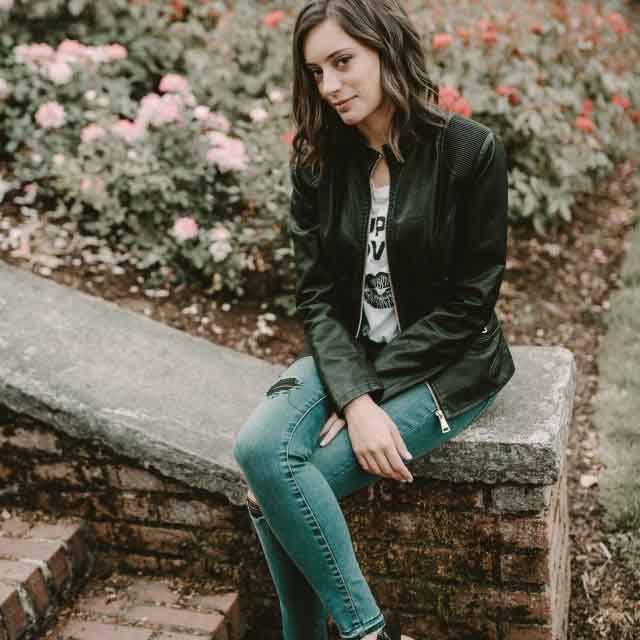Journalist Alexandra Bradford embarked on her path to covering conflicts in the Middle East on the morning of September 11, 2001. As a child, Alexandra was interested in world history and foreign affairs. When her friends were off reading Nancy Drew and watching cartoons, Alexandra was making her way through the entire Encyclopaedia Britannica and watching CNN.
When the attacks on September 11th happened, Alexandra Bradford became determined to gather as much information as possible about radical Islam and the social, economic and personal factors that contribute to radicalisation. This quest sent her from her home in the U.S. to London where she received her M.A in Terrorism, Security and Society from the prestigious King’s College, London.
After completing her graduate studies, Alexandra Bradford worked as a terrorism researcher where she became one of the first researchers to uncover the trend of western women joining the Islamic State in Syria and Iraq. Now, as a journalist, Alexandra covers wars, conflict and humanitarian issues in the Middle East. Alexandra’s work is invaluable. She puts herself in challenging situations, giving those in need a chance to tell their story.
We were lucky to have the chance to speak to Alexandra about her life and the industry she works in. We found out more about her and how she takes care of herself in such a demanding line of work.

Photo Credit Sarah Welsh
Taylor Magazine: How did you get into foreign correspondent work?
Alexandra Bradford: I’ve always been interested in foreign affairs and politics. As a child, I was lucky enough to be able to travel and see parts of the world that were different from my own. We spent a lot of time talking about world events and politics in my family. Even as young children, my sister and I were expected to hold our own in discussions and debates about what was going on in the world, whether those discussions were about local politics or the war in Bosnia. When I was ten I requested a subscription to the New York Times and The Economist for Christmas – I think all my friends found it really strange at the time, but even now it’s still one of my favourite gifts!
It sounds cliché, but being raised in an environment where my curiosity about the world was nurtured and where I was encouraged to think critically about foreign affairs was such an important foundation for me. It ignited a lifelong passion for world affairs that still burns strongly today.
I was around 13 when the attacks on September 11th happened and this added a new perspective to my life. My uncle, who is a doctor, was working in the Pentagon on that day. I remember how terrifying it was for my family to not know if he was alive or dead. For hours we waited to hear news about him and then at one point we saw him on T.V. He was alive and was the first doctor on the scene to perform triage. The impact of that fear and how grateful we were that he was alive and unharmed reverberated throughout my family for a long time.
Immediately after the attacks, I became obsessed with learning as much as I could about the attacks. I kept asking myself “why would someone become a terrorist?” In many ways, this need to understand is the reason that I’m here today, in this career, because I still need to understand why things happen.
The “why” question led me to London where I lived for six years, first to study and then to work as a terrorism researcher. I have a joint honours degree in Politics and History and then went on to receive my MA in the War Studies department at King’s College, London where I specialised in Terrorism, Security and Society. I was really fortunate with my MA because I was taught by some of the top terrorism experts in the field, people like Alexander Hitchens, Peter Neumann and Shiraz Maher – that experience was crucial.
“Telling stories that would otherwise go untold and giving a voice to the voiceless is the most rewarding part of the job.”
This period was also a major turning point in my career because I was studying female radicalisation for my master’s thesis. My research from this period ended up forming the basis of a report I co-authored and this was such an important break in my career. I have so much gratitude for the researchers who gave me a start, especially ISD for giving me the platform to publish my research. I had to really fight to get my research on women published and I am enormously grateful that ISD took a risk on me. I learned an important lesson from this experience in not giving up when I know a story is important and impactful.
After the report was published I realised that while I love academia and the terrorism research world, my passion is really in uncovering a story that hasn’t been told before and presenting that story in a way that causes the public to pay attention and to gain knowledge and understanding about people in different parts of the world. There is always the hope that if enough people know about a conflict or a humanitarian issue, or if they simply understand the drivers or push and pull factors that lead to violence, that somehow violence and hatred will decrease.
In November 2015 I moved to New York City where I spent the year networking with other female journalists who I admire. What I really appreciate about this industry is how welcoming and encouraging other female journalists have been to me — I have learned so much from my colleagues and really admire the camaraderie.
Since leaving the research world I have covered war, conflict and humanitarian issues in the Middle East as a freelancer. For much of the past year, I was in South East Asia. When I reflect back on the past few years I have an overwhelming feeling of gratitude at having been able to travel the world, meet new people and have experiences that I would not have had if I had stayed rooted in London or the U.S. I feel very privileged to have this life and to have this job.
Taylor Magazine: Do you ever find yourself in danger? If so, how do you overcome this?
Alexandra Bradford: There is this image of journalists who cover conflict and the Middle East as being adrenaline junkies, but that certainly isn’t me, I would never purposely seek out danger. What I love the most about my work is being able to talk to people, get to know them, understand what their lives are like and report back in a way that hopefully informs the public.
I have a huge amount of respect for other freelance journalists who do report from war zones, but that is a risk I won’t take while working as a freelancer. I’m learning Arabic right now and will be learning as many local dialects from the region as possible over the next couple of years because I feel like in order to safely navigate a conflict zone, especially as a freelancer, I need to have a much better grasp on the dialogue. The work journalists do is important, but it’s only important if we can make it out alive and report our findings to the public.
Taylor Magazine: What do you find the most interesting or rewarding part of your job?
Alexandra Bradford: Telling stories that would otherwise go untold and to give a voice to the voiceless is the most rewarding part of the job. There are times where I feel so honoured because I am witnessing history unfold and I am contributing to the world’s knowledge base and record of events.
I have been privileged to meet and interview many people who are doing some amazing work and contributing positively to the world. For instance, I interviewed Negin Khpalwak, she is the first female orchestra conductor in Afghanistan. Negin has faced death threats from the Taliban and from her own family for simply playing music. When I talked to her I was struck by how brave and determined she is. She keeps playing and living her passion so that she can inspire women in Afghanistan to live their own dreams.

Taylor Magazine: What’s the most challenging part of doing this line of work?
Alexandra Bradford: Writing about conflict can be emotionally challenging. I have spent much of the past two years writing about the Syrian conflict and telling the stories of ordinary Syrians who have been left devastated by this conflict. Syria has devastated me so many times. This story and the sources I know who live there remain close to my heart, I often go to sleep thinking about the situation and wake up thinking about new ways to tell this story, to show people what is going on there and to make people take note of the suffering.
Another challenge is how consuming the work can be. There are so many nights where I am up all night writing. It sounds exhausting, but I actually thrive in this environment because telling these stories and working as a journalist is what I most passionate about. I am also in a time in my life where I want to be 100% focused on work and on learning and improving as much as possible. I feel really fired up about it.
At the same time, while work is my passion, I think it’s also important to take breaks when I can and enjoy my personal life. I want to keep producing the best work that I can which means that when I am not working, I need to take care of myself. To get away from thinking about conflict and violence I do things like going dancing with friends and just having as much fun and as many social interactions with my friends as possible. I also have a rule where I don’t read anything conflict or Middle East related before bed, otherwise, I start dreaming about work. Right now I’m re-reading Marcus Aurelius’s “Meditations” – the pages have fallen out because I’ve read it so many times this summer! I’m also inhaling everything written by Dani Shapiro and have fallen in love again, after being obsessed with the Russians in high school, with Ivan Turgenev’s work.
Taylor Magazine: What advice would you give to anyone that wants to go into this field?
Alexandra Bradford: Be curious about the world. Where I am now is the result of my curiosity, it’s why I’m keen to absorb as much information as possible and why I’m drawn to meeting new people and having new experiences. I have learned over the past few months how important it is to be as social as possible in public situations. My go to response before was to watch and observe and while that is often an important skill in this job, it’s just as important to have the confidence to strike up a conversation with a random person. There’s also an important lesson there in that you should always be learning, growing and becoming better, both as a person and in your career. Get curious and honest with yourself about your weaknesses and do what you need to do to turn them into strengths.
I’d also advise travelling as much as possible. Paris and Amsterdam are great and while I have loved visiting the big European cities, I always find more value and joy in visiting places off the beaten track. When I go to Europe or when I’m in Asia I’m always most excited about visiting the smaller towns and cities. These are places that are steeped in rich history and culture. I have very fond memories of a small town in Italy that I visited last summer; I have a long list of small towns all over the world that I’ll visit over the course of my life for this very reason. Learning languages is also very important in this career. I studied French as a child and wish I had tackled more languages when I was younger so I could fluently conduct interviews in different languages.
“Be curious about the world. Where I am now is the result of my curiosity, it is why I am keen to absorb as much information as possible and why I am drawn to meeting new people and having new experiences.”
Read more about Alexandra and her work on her website, where you’ll be able to read some of her incredible stories.

